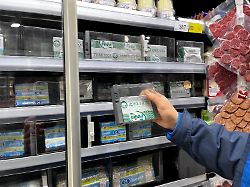Butter and toothpaste luxury goods
Turkish population groans under extreme inflation
January 13, 2024, 8:29 a.m
Listen to article
This audio version was artificially generated. More info | Send feedback
With his low interest rate policy, Turkish President Erdogan is triggering a currency crisis. The inflation rate in Turkey is currently just under 65 percent. This drives many people into existential crises. But it’s not just low-income earners who are affected.
When market vendor Sabri Yavuz sets out in the morning to sell white cabbage and lemons, he already knows that he will go home in the evening with too little money. “We can’t make ends meet,” says the 45-year-old. On the table in front of him are piles of thick cabbages that he sells at an Istanbul market. People didn’t buy anything, many complained about the prices, says the father of the family, who often doesn’t know what to do next. The inflation rate in Turkey was recently at a whopping 64.77 percent year-on-year and is expected to rise in the coming months. This is driving people in the middle and lower classes in particular into existential crises.
The reason for the high inflation is the economic policy that Turkish President Recep Tayyip Erdogan has pushed in the past. Low interest rates at any price. Inflation skyrocketed and was more than 85 percent in October 2021. Only after the elections in May 2023 and a change at the top of the central bank and the Ministry of Economic Affairs did Erdogan initiate a change of course. The key interest rate was raised significantly and is currently 42.40 percent. But the fight against inflation takes a long time. The fact that things have become significantly tighter financially for many people is also evident in supermarkets, where butter, toothpaste, olive oil or baby food are sometimes only put on the shelves with alarm protection.
Anyone who criticizes Erdogan faces prison
Last year, communications designer Mahir Akkoyun designed a sticker to express his dissatisfaction with the price increases. “Is this product too expensive? Thanks to Erdogan,” it said, next to a photo of the Turkish president. The author was quickly arrested and charged, although he was acquitted in the trial. Housing in particular has become unaffordable for many people. In November 2023, prices nationwide were on average 86.5 percent higher than in the previous year. In no other OECD country did rents rise as sharply as in Turkey in the fourth quarter of 2023, according to statistics from the organization. Because rent increases are legally limited to 25 percent, many landlords try every means possible to evict their tenants. Civil courts are reportedly groaning under a flood of rental eviction lawsuits.
The head of the central bank, Hafize Gaye Erkan, recently complained about the real estate crisis in an interview that caused quite a stir. She couldn’t find affordable housing in Istanbul and so moved back in with her mother. According to reports, the head of the central bank earns around 5,000 euros a month and her statements therefore met with a lot of incomprehension among low-income earners. Erol Günes sells handbags at markets six days a week. “We belong to the lowest class in Turkey. We are doing poorly, the rich are doing well. But no one dares to say that. Anyone who says it is in jail two minutes later,” says the 50-year-old Kurd and father of two Children. He tries to make ends meet with ten credit cards in his wallet. So far he has debts of 200,000 lira (a good 6,000 euros). Everyone did it that way.
Attempted suicide because of high debts
In late December, debts drove a 42-year-old father of four to throw himself into the foyer from the third floor of an Istanbul shopping center. Clinging to the parapet, he shouted: “I’m hungry, my children are hungry, I’m in debt.” The man survived with serious injuries. “Inflation is destroying the middle class and leading to extremes. The rich are getting richer, the poor are getting poorer,” says economist Seref Oguz. In street surveys, people report that they go to bed hungry and have to start working again when they are over 70 because their pension is not enough to survive. The minimum wage, which, according to the government, 37 percent of people receive, was recently raised to 17,002 lira (518 euros). Trade unions criticized this as clearly not enough. According to the employee representative body Türk-Is, the poverty line in December was 47,000 lira (around 1,433 euros).
Economist Oguz does not believe in the government’s forecast that inflation will fall to 34 percent by the end of the year. He doubts that the government will have the staying power needed to combat inflation. “In order to bring them down in the long term, the orthodox economic policy must be strictly continued. At the same time, the government must also give up its populist rhetoric and implement strong austerity measures in public spending.” Last year, the government repeatedly made election gifts worth billions. Observers assume that she will also dig deep into her pockets before the nationwide local elections scheduled for March 31 in order to win Istanbul, the country’s most populous municipality.
